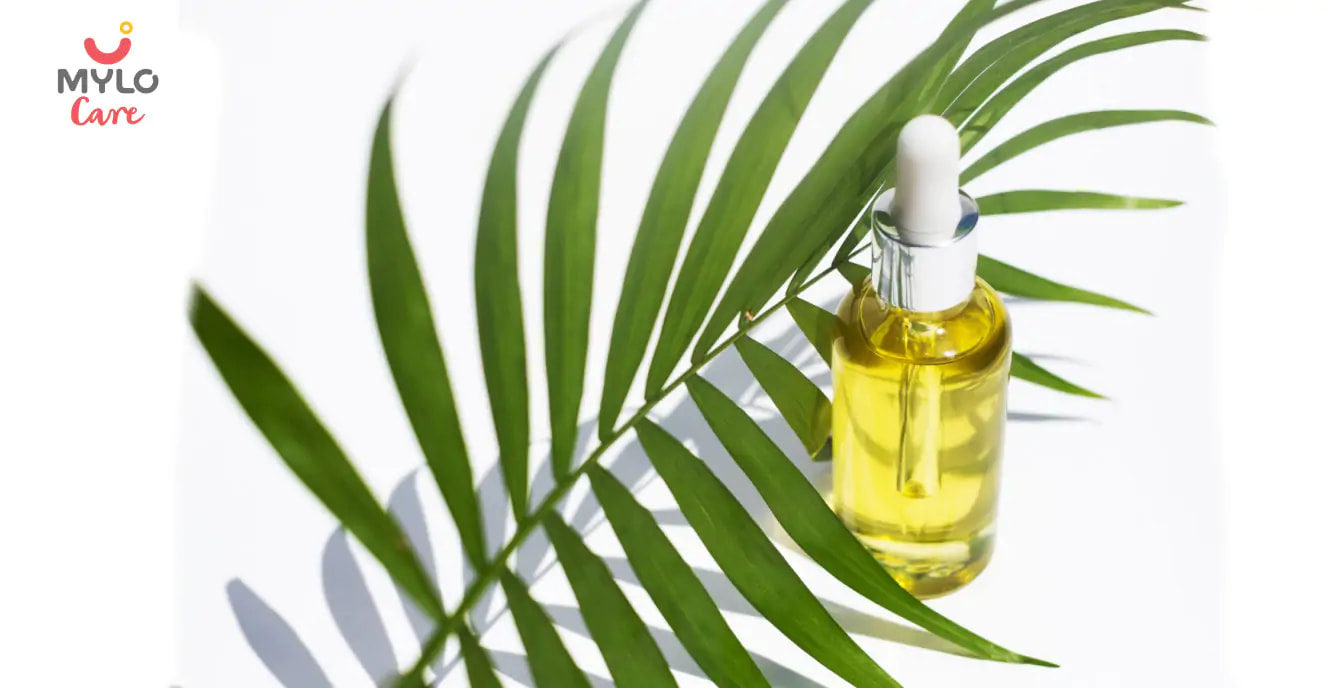Get MYLO APP
Install Mylo app Now and unlock new features
💰 Extra 20% OFF on 1st purchase
🥗 Get Diet Chart for your little one
📈 Track your baby’s growth
👩⚕️ Get daily tips

OR


Article Continues below advertisement
- Home

- The Ultimate Guide to the Benefits of Tea Tree Oil
In this Article
- Tea Tree Meaning
- 10 Benefits of Tea Tree Oil
- 1. Antibacterial Properties
- 2. Anti-Inflammatory Effects
- 3. Antifungal Activity
- 4. Natural Deodorant
- 5. Acne Treatment
- 6. Relieves Congestion
- 7. Promotes Hair Health
- 8. Natural Household Cleaner
- 9. Relieves Skin Irritations
- 10. Oral Health Benefits
- Are There Any Side Effects of Tea Tree Oil?
- 1. Skin Irritation
- 2. Toxicity
- 3. Hormonal Effects
- 4. Eye Irritation
- 5. Drug Interactions
- Key Takeaways
Pregnancy
 768
768The Ultimate Guide to the Benefits of Tea Tree Oil
Updated on 5 February 2024
If you're on a quest for a natural remedy that's as versatile as it is powerful, look no further than tea tree oil. This little bottle of magic has been captivating the world with its incredible array of benefits, from soothing acne to tackling fungal infections. In this article, we will explore the benefits of tea tree oil, its uses and any side effects you should know about.
Tea Tree Meaning
Tea tree oil, also known as melaleuca oil, is derived from the leaves of the tea tree plant, scientifically known as Melaleuca alternifolia. Indigenous to Australia, the tea tree plant has been used for centuries by the Aboriginal people for its medicinal properties. However, it is important to note that tea tree oil should not be ingested as it can be toxic.
10 Benefits of Tea Tree Oil
Tea tree oil has gained popularity in recent years due to its numerous health benefits. Here are ten tea tree oil uses that can improve your overall well-being:
Article continues below advertisment
1. Antibacterial Properties
Tea tree oil contains natural antibacterial compounds that can help fight against various types of bacteria, such as E. coli and Staphylococcus aureus. Applying tea tree oil topically can aid in the treatment of skin infections and prevent their recurrence.
2. Anti-Inflammatory Effects
The anti-inflammatory properties of tea tree oil make it a valuable ingredient in skincare products. It can soothe and reduce inflammation in conditions like acne, eczema, and psoriasis, promoting healthier skin.
3. Antifungal Activity
Tea tree oil has antifungal properties that can effectively combat fungal infections like athlete's foot and nail fungus. Its ability to penetrate the skin and inhibit fungal growth makes it a popular natural remedy.
You may also like: Can Tea Tree Oil Help Rejuvenate Your Skin?
4. Natural Deodorant
Due to its antimicrobial properties, tea tree oil can be used as a natural deodorant to combat body odor. It helps neutralize the bacteria that cause unpleasant smells, making it a safer alternative to conventional deodorants.
Article continues below advertisment
5. Acne Treatment
Tea tree oil possesses powerful antiseptic properties that can help treat acne. It penetrates the skin and unclogs pores, reducing the severity of breakouts and preventing future acne flare-ups.
You can use skin care products infused with tea tree such as tea tree face wash, tea tree face mask and tea tree face cream to reap its anti-acne benefits. You can also get these products from Mylo Care, which are free from harmful toxins and full of tea tree oil benefits.
6. Relieves Congestion
Inhaling tea tree oil can provide relief from respiratory congestion caused by allergies, colds, or sinusitis. Its expectorant properties help clear the airways and alleviate symptoms of congestion.
7. Promotes Hair Health
Tea tree oil is known to improve scalp health by unclogging hair follicles and promoting hair growth. It can also help in the treatment of dandruff and dry, itchy scalp conditions.
8. Natural Household Cleaner
Tea tree oil's antimicrobial properties make it an effective natural household cleaner. It can be used to disinfect surfaces and eliminate mold and mildew without the harmful side effects of chemical cleaners.
Article continues below advertisment
9. Relieves Skin Irritations
Tea tree oil can provide relief from skin irritations like insect bites, sunburns, and rashes. Its soothing properties help reduce redness, inflammation, and itching, promoting faster healing.
10. Oral Health Benefits
The antibacterial properties of tea tree oil make it beneficial for oral health. It can help combat bad breath, gingivitis, and plaque formation when used as a mouthwash or added to toothpaste.
You may also like: Top 5 Ways Tea Tree Oil Helps In Treating Skin Flaws
Are There Any Side Effects of Tea Tree Oil?
While tea tree oil offers numerous benefits, it is essential to use it with caution and be aware of potential side effects. Here are a few things to consider:
1. Skin Irritation
Some individuals may experience skin irritation or allergic reactions when using tea tree oil. It is advisable to perform a patch test before applying it to larger areas of the skin.
Article continues below advertisment
2. Toxicity
Tea tree oil is toxic when ingested. It should never be swallowed, as it can cause nausea, vomiting, and other severe symptoms. Keep it out of reach of children and pets.
3. Hormonal Effects
There is some evidence that tea tree oil may have hormonal effects when used in higher concentrations. It is advisable to avoid using undiluted tea tree oil on the skin for extended periods, especially in children and pregnant women.
4. Eye Irritation
Direct contact with tea tree oil can cause eye irritation. If accidental contact occurs, rinse the eyes thoroughly with water and seek medical attention if irritation persists.
5. Drug Interactions
Tea tree oil may interact with certain medications, including antifungal drugs and antidiabetic medications. Consult with a healthcare professional before using tea tree oil if you are taking any medications.
Key Takeaways
Tea tree oil, derived from the leaves of the tea tree plant, offers a wide range of benefits for overall health and well-being. Its antibacterial, anti-inflammatory, and antifungal properties make it a valuable addition to skincare routines, hair care products, and natural remedies. Despite numerous benefits of tea tree oil, it is important to be cautious and aware of potential side effects of tea tree oil, such as skin irritation and hormonal effects.
Article continues below advertisment



Written by
Anandita Sharma
Drawing on more than a decade of expertise in administration, Anandita Sharma currently serves as a content operations e
Read MoreGet baby's diet chart, and growth tips

Related Articles
Related Questions
Hello frnds..still no pain...doctor said head fix nhi hua hai..bt vagina me pain hai aur back pain bhi... anyone having same issues??
721 views
Kon kon c chije aisi hai jo pregnancy mei gas acidity jalan karti hain... Koi btayega plz bcz mujhe aksar khane ke baad hi samagh aata hai ki is chij se gas acidity jalan ho gyi hai. Please share your knowledge
728 views
I am 13 week pregnancy. Anyone having Storione-xt tablet. It better to have morning or night ???
739 views
Hlo to be moms....i hv a query...in my 9.5 wk i feel body joint pain like in ankle, knee, wrist, shoulder, toes....pain intensity is high...i cnt sleep....what should i do pls help....cn i cosult my doc.
744 views
Influenza and boostrix injection kisiko laga hai kya 8 month pregnancy me and q lagta hai ye plz reply me
751 views
RECENTLY PUBLISHED ARTICLES
our most recent articles

Education
The A-Z Guide on Purple Colour Fruits and Vegetables for Kids
(2,713 Views)

Education
The A-Z Guide on Red Colour Fruits & Red Colour Vegetables for Kids
(1,590 Views)

Education
The A-Z Guide on Yellow Fruits & Yellow Colour Vegetables for Kids
(3,023 Views)

Women Specific Issues
Cervical Cancer: Causes, Symptoms & Prevention
(26,740 Views)

Education
The A-Z Guide to Identifying Stem Vegetables for Kids
(2,037 Views)

Fetal Heartbeat
Can Fetal Heartbeat Disappear and Reappear?
(35,877 Views)
- The Ultimate Guide to Teaching Children 20 to 30 Tables
- GK Questions for Kids from Nursery to Class 6
- Height and Weight Chart for Boys and Girls in India
- The A-Z Guide to Identifying Winter Vegetables for Kids
- Dalia in Pregnancy: A Superfood for the Health of Both Mom and Baby
- 1st Birthday Wishes for Your Little One's Big Day
- The Ultimate Guide to Consuming Litchi During Pregnancy
- Almonds in Pregnancy: Cracking the Nutty Secret to Their Benefits
- Popping the Question: Is It Safe to Indulge in Popcorn in Pregnancy?
- Cherry Fruit in Pregnancy: What Every Expectant Mother Should Know
- The Ultimate Guide to Consuming Pista During Pregnancy
- Sugarcane Juice in Pregnancy: Benefits & Precautions
- The Ultimate Guide to Consuming Mushroom in Pregnancy
- The Ultimate Compilation of GK Questions and Their Answers


AWARDS AND RECOGNITION
Mylo wins Forbes D2C Disruptor award
Mylo wins The Economic Times Promising Brands 2022
AS SEEN IN
















At Mylo, we help young parents raise happy and healthy families with our innovative new-age solutions:
- Mylo Care: Effective and science-backed personal care and wellness solutions for a joyful you.
- Mylo Baby: Science-backed, gentle and effective personal care & hygiene range for your little one.
- Mylo Community: Trusted and empathetic community of 10mn+ parents and experts.
Product Categories
baby carrier | baby soap | baby wipes | stretch marks cream | baby cream | baby shampoo | baby massage oil | baby hair oil | stretch marks oil | baby body wash | baby powder | baby lotion | diaper rash cream | newborn diapers | teether | baby kajal | baby diapers | cloth diapers |












